Saturday, September 18, 2004
Bill Clinton Should Have My Health Insurance
It’s too bad that former President Bill Clinton didn’t have the same insurance company I had. If he did, he might have been spared a great deal of pain and surgery-induced heartache. He also might have extended his life and saved some money in the process.
Like Clinton, I began to experience chest tightness earlier this year. Ironically, it happened whenever I did the one thing we’re always told we don’t do enough of: exercise. I’d walk only a few blocks, and I’d feel a non-painful chest tightness and shortness of breath. It went away when I was at rest.
In April, my primary care physician performed an EKG that appeared normal. Even so, she felt that I should consult a cardiologist and seek further tests. The cardiologist at the state-of-the-art, multi-million dollar Indiana Heart Hospital ordered a stress test and imaging study of my heart, the results of which were deemed “abnormal.”
The cardiologist scheduled me for an angiogram, an invasive procedure in which a catheter with a camera on the end is inserted in the leg and threaded into the heart to get a closer look. I was warned that I likely had blockages in one or more coronary arteries that would require the placement of stents.
The doctor’s reaction when I requested the procedure to be postponed until May because of a planned vacation led me to believe that my situation was not life-threatening.
At 5:30 a.m. on May 10, I arrived at the four-star hotel they call the Indiana Heart Hospital for the outpatient procedure. A guest relations representative escorted me through the double doors to a small room in Suite C.
As I emerged from my twilight sleep, I was double-teamed by my heart specialist and a cardiothoracic surgeon he had paged for an emergency consult. The specialist told me that I had massive blockages to each of my three coronary arteries and surrounding vessels that supply oxygen to my heart. He said so many blockages were involved that stents would not be effective. I would need a quintuple bypass.
The surgeon, summoning up his most understanding bedside manner, shared that he understood how I felt because he had undergone surgery recently himself. It was Monday, and he anticipated doing the surgery on Wednesday or Thursday. The surgeon explained that I would need pre-operative instruction, which would be best for me to do while still in the hospital.
On Wednesday night, I prepared for Thursday morning surgery just as the physical therapist and nurse had instructed. But that same nurse called and said that the surgeon was not in network with my insurance. The procedure would be postponed until a network surgeon could be found.
A retired Army nurse, I normally would be the first to conduct in-depth research into any diagnosis and its possible treatments. But the anesthesia affected my judgment. Thankfully, I was thinking more clearly after the news about my insurance.
My research led me to an obscure web site run by Howard H. Wayne a renegade cardiologist in San Diego. Dr. Wayne is a rare commodity in medicine: he cares more about his patients than the bottom line. A master of customer service, he personally oversees every aspect of his patients’ care.
Dr. Wayne said that bypass surgery is unnecessary in 98 percent of patients. But the $40,000 price tag for the procedure, versus the cost of simple medications, makes surgery attractive to the doctors who perform it.
Unfortunately, statistics show that 53 percent of patients who undergo the surgery or angioplasty are likely to die or have a heart attack within five years. Those treated with medication have only a 5 percent chance of this outcome. In addition, those who are 56 years young, as I am, likely face a repeat bypass operation within 20 years.
I had been told by the surgeon that while my arteries were clogged, my heart was strong. This makes little sense because a heart can be strong only when it receives sufficient oxygen, which theoretically would not be possible with 90-percent and 100-percent blockages. What the surgeon and cardiologist didn’t tell me was that the body creates its own bypass system, making surgery not only unnecessary but detrimental.
After visiting Dr. Wayne, I learned that my chest tightness, as is almost always the case, was caused by high blood pressure. Interestingly, my blood pressure was normal – at rest. That is how most physicians record it. But Dr. Wayne likes to see how blood pressure performs under stress. My resting blood pressure was 120/70, perfectly normal. But Dr. Wayne performed a non-invasive test, asking me to squeeze a handgrip measuring instrument for one minute. The result: 140/110. It could have been as high as 200/150, he said, if my primary care physician had not already started me on beta blockers.
Since early June, I have been on a regimen of several medications that have lowered my blood pressure to 90/50. This may sound far too low, but Dr. Wayne said plaque in the arteries is encouraged by blood coursing through too quickly, causing injury. The lower the blood pressure, he says, the less chance for such injury.
And have I mentioned, that I haven’t had the chest tightness or shortness of breath since starting his regimen? According to Dr. Wayne, I am likely to live a long, full life. I am very grateful to the surgeon who was not in network with my insurance company and Dr. Wayne for that.
Like Clinton, I began to experience chest tightness earlier this year. Ironically, it happened whenever I did the one thing we’re always told we don’t do enough of: exercise. I’d walk only a few blocks, and I’d feel a non-painful chest tightness and shortness of breath. It went away when I was at rest.
In April, my primary care physician performed an EKG that appeared normal. Even so, she felt that I should consult a cardiologist and seek further tests. The cardiologist at the state-of-the-art, multi-million dollar Indiana Heart Hospital ordered a stress test and imaging study of my heart, the results of which were deemed “abnormal.”
The cardiologist scheduled me for an angiogram, an invasive procedure in which a catheter with a camera on the end is inserted in the leg and threaded into the heart to get a closer look. I was warned that I likely had blockages in one or more coronary arteries that would require the placement of stents.
The doctor’s reaction when I requested the procedure to be postponed until May because of a planned vacation led me to believe that my situation was not life-threatening.
At 5:30 a.m. on May 10, I arrived at the four-star hotel they call the Indiana Heart Hospital for the outpatient procedure. A guest relations representative escorted me through the double doors to a small room in Suite C.
As I emerged from my twilight sleep, I was double-teamed by my heart specialist and a cardiothoracic surgeon he had paged for an emergency consult. The specialist told me that I had massive blockages to each of my three coronary arteries and surrounding vessels that supply oxygen to my heart. He said so many blockages were involved that stents would not be effective. I would need a quintuple bypass.
The surgeon, summoning up his most understanding bedside manner, shared that he understood how I felt because he had undergone surgery recently himself. It was Monday, and he anticipated doing the surgery on Wednesday or Thursday. The surgeon explained that I would need pre-operative instruction, which would be best for me to do while still in the hospital.
On Wednesday night, I prepared for Thursday morning surgery just as the physical therapist and nurse had instructed. But that same nurse called and said that the surgeon was not in network with my insurance. The procedure would be postponed until a network surgeon could be found.
A retired Army nurse, I normally would be the first to conduct in-depth research into any diagnosis and its possible treatments. But the anesthesia affected my judgment. Thankfully, I was thinking more clearly after the news about my insurance.
My research led me to an obscure web site run by Howard H. Wayne a renegade cardiologist in San Diego. Dr. Wayne is a rare commodity in medicine: he cares more about his patients than the bottom line. A master of customer service, he personally oversees every aspect of his patients’ care.
Dr. Wayne said that bypass surgery is unnecessary in 98 percent of patients. But the $40,000 price tag for the procedure, versus the cost of simple medications, makes surgery attractive to the doctors who perform it.
Unfortunately, statistics show that 53 percent of patients who undergo the surgery or angioplasty are likely to die or have a heart attack within five years. Those treated with medication have only a 5 percent chance of this outcome. In addition, those who are 56 years young, as I am, likely face a repeat bypass operation within 20 years.
I had been told by the surgeon that while my arteries were clogged, my heart was strong. This makes little sense because a heart can be strong only when it receives sufficient oxygen, which theoretically would not be possible with 90-percent and 100-percent blockages. What the surgeon and cardiologist didn’t tell me was that the body creates its own bypass system, making surgery not only unnecessary but detrimental.
After visiting Dr. Wayne, I learned that my chest tightness, as is almost always the case, was caused by high blood pressure. Interestingly, my blood pressure was normal – at rest. That is how most physicians record it. But Dr. Wayne likes to see how blood pressure performs under stress. My resting blood pressure was 120/70, perfectly normal. But Dr. Wayne performed a non-invasive test, asking me to squeeze a handgrip measuring instrument for one minute. The result: 140/110. It could have been as high as 200/150, he said, if my primary care physician had not already started me on beta blockers.
Since early June, I have been on a regimen of several medications that have lowered my blood pressure to 90/50. This may sound far too low, but Dr. Wayne said plaque in the arteries is encouraged by blood coursing through too quickly, causing injury. The lower the blood pressure, he says, the less chance for such injury.
And have I mentioned, that I haven’t had the chest tightness or shortness of breath since starting his regimen? According to Dr. Wayne, I am likely to live a long, full life. I am very grateful to the surgeon who was not in network with my insurance company and Dr. Wayne for that.
Subscribe to:
Post Comments (Atom)







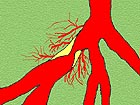
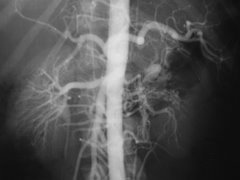
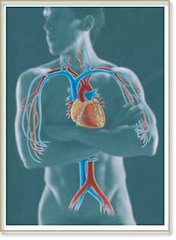
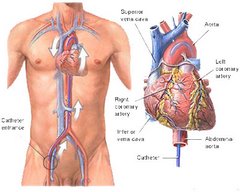
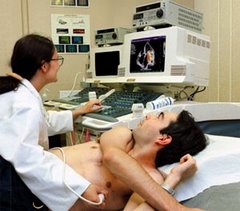
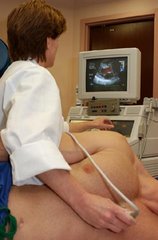
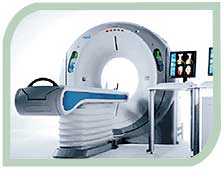
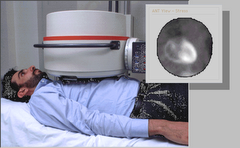
No comments:
Post a Comment